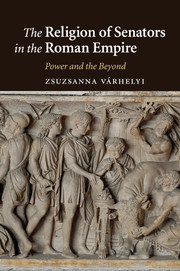5 - Towards a “theology” of Roman religion
Published online by Cambridge University Press: 06 July 2010
Summary
As in the republic, Roman religion in the empire was not grounded in a central and foundational theology, and therefore the common modern notion that religions are to be characterized by their central theological doctrines cannot adequately be applied in a discussion of Roman senatorial religion. The assertion that there was a “knowledge” component to the conceptualization of religion among senators requires further investigation, as does the place of imperial power, with its religious implication, within this conceptual framework. Chronology is key here: as Arnaldo Momigliano convincingly showed for the final years of the republic, the political upheavals of the times led Roman elites to a deeper engagement with religious questions. Though the pressing theological questions discussed by Cicero or Varro have no parallel in our period, their language and concerns feed into senatorial discussions about religion in the empire. To borrow Momigliano's phrase, “the theological efforts” of the upper classes continued during the empire as well; and in this chapter I shall keep “theology” in inverted commas in order to emphasize the difference between the less foundational role of these considerations among the Roman imperial elite and our modern expectations of the central role of theology for any religion.
The chapter begins with a consideration of imperial approaches to talking about religion, noting how religious discourses contributed to the conceptualization of the divine. These knowledge frameworks provided a variety of concurrent foci for understanding the religious.
- Type
- Chapter
- Information
- The Religion of Senators in the Roman EmpirePower and the Beyond, pp. 153 - 185Publisher: Cambridge University PressPrint publication year: 2010



